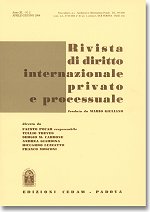Reminder: Conference on Minimum Standards in European Civil Procedure Law
As mentioned earlier on this blog, Matthias Weller from EBS Law School and Christoph Althammer (now) from the University of Regensburg will host a conference on minimum standards in European Civil Procedure in Wiesbaden on 14 and 15 November 2014. Further information is available on the conference website. Registration is still open.
The conference language will be German.
The programme reads as follows:
Friday, 14 November, 2 – 4 p.m.:
Welcome remarks
Prof. Dr. Matthias Weller, EBS Law School
Minimum standards und core procedural principles from a German law perspective: European Convention on Human Rights/German constitutional law/German national law
Prof. Dr. Christoph Althammer, University of Regensburg
Minimum standards und core procedural principles from a French law perspective: European Convention on Human Rights/French constitutional law/French national law
Prof. Dr. Frédérique Ferrand, Université Jean Moulin, Lyon
Friday, 14 November, 5 – 7 p.m.:
Minimum standards und core procedural principles from a UK law perspective: European Convention on Human Rights/UK constitutional law/UK national law
Prof. Dr. Matthias Weller, EBS Law School
Transnational synthesis: ALI/UNIDROIT Principles of Civil Procedure
Prof. Dr. Thomas Pfeiffer, Ruprecht-Karls-University Heidelberg
Friday, 14 November, 7 p.m.:
Panel Discussion
***
Saturday, 15 November, 9 – 11 a.m.:
Minimum standards and procedural principles in criminal law proceedings under European influence
Prof. Dr. Michael Kubiciel, University of Cologne
Minimum standards and procedural principles in administrative law proceedings under European influence
Prof. Dr. Andreas Glaser, University of Zurich
Saturday, 15 November, 11.30 a.m. – 1.30 p.m.:
Minimum standards and procedural principles in public and private antitrust law proceedings under European influence
Prof. Dr. Friedemann Kainer, University of Mannheim
Minimum standards and procedural principles in intellectual property law under European influence
Prof. Dr. Mary-Rose McGuire, University of Mannheim
Saturday, 15 November, 2.30 – 3.30 p.m.:
European law synthesis: Minimum standards and procedural principles in the aquis communautaire/ conclusions for European Principles of Civil Procedure
Prof. Dr. Burkhard Hess, Director of the Max Planck Institute Luxemburg for International, European and Regulatory Procedural Law
Saturday, 15 November, 3.30 p.m.:
Panel Discussion
